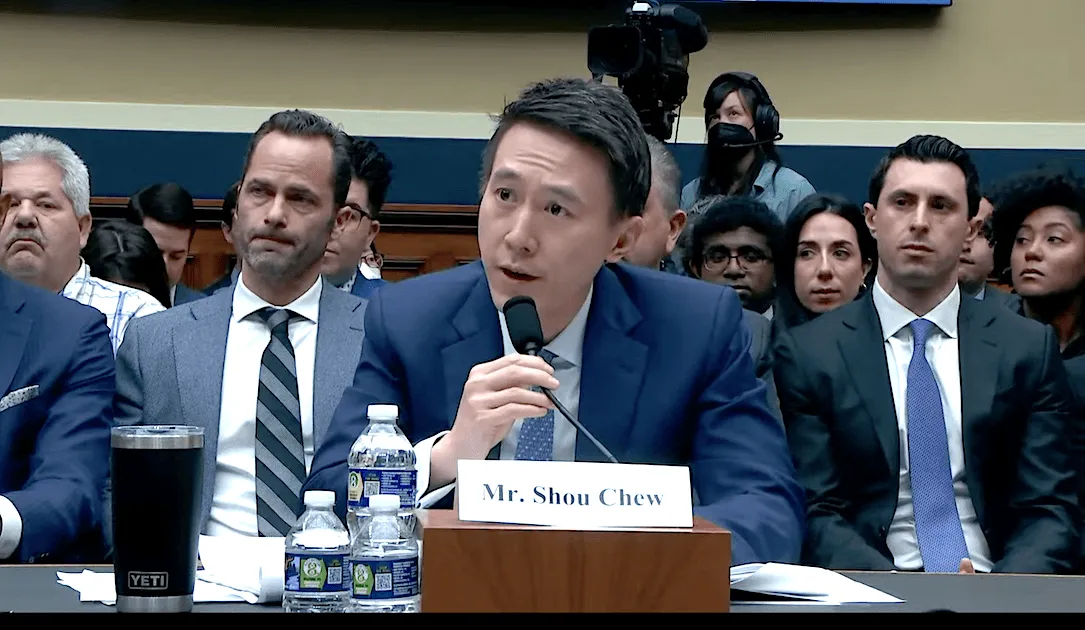US lawmakers tell TikTok CEO the app ‘should be banned’
TikTok’s chief executive attempted on Thursday to dispel concerns that the short-form video app poses a cybersecurity and national security risk in his first time testifying to a U.S. House committee.
Bipartisan lawmakers on the House Energy and Commerce Committee pressed Shou Chew, who took the helm of TikTok in 2021, about the app’s ties to the Chinese government in a grueling hearing that was expected to last more than four hours. Under Beijing’s security laws, the Chinese Communist Party could compel TikTok to hand over the data it collects on U.S. users, committee members warned.
Chew began his testimony by distancing TikTok from the Chinese government. He emphasized that he is Singaporean with deep roots in the U.S., and that TikTok’s parent company ByteDance has three Americans on its five-member board. He also flagged initiatives that the company has touted in recent months, such as moving data on American users to domestic servers operated by Oracle — something TikTok calls “Project Texas” because of Oracle’s headquarters in Austin.
“ByteDance is not owned or controlled by the Chinese government. It’s a private company,” Chew said.
However, hours before Chew’s testimony China’s Commerce Ministry said that a sale or spinoff of TikTok would “involve exporting technology and had to be approved by the Chinese government,” The Wall Street Journal reported.
Several lawmakers highlighted the announcement, arguing that China believes it has authority over the app and its data, and shouldn’t be allowed to operate in the U.S. “Your platform should be banned,” the committee Chairwoman Cathy McMorris Rodgers (R-WA), told Chew.
The hearing comes as governments around the world have taken steps to ban TikTok over its ties to China. In February, the Biden administration gave federal agencies 30 days to purge the app from their devices. The European Union, New Zealand, Canada, India and others have banned the app from government devices in some form.
Even without congressional action, TikTok’s future in the U.S. remains uncertain. Dozens of states also have taken steps to ban the app from government devices, while federal officials with the Committee on Foreign Investment in the United States (CFIUS) are demanding Chinese owners sell their stake in the company or face a ban.
The Justice Department is also investigating ByteDance’s surveillance of American citizens after the company admitted late last year that employees had inappropriately obtained user data on two reporters. The team, which was responsible for monitoring employee conduct, was attempting to find the sources of suspected leaks.
Privacy and misinformation concerns
In addition to TikTok’s ties to the Chinese government, lawmakers warned of other dangers that they saw in the app, including its use to spread harmful content and misinformation, as well as the threats that it poses to children and user privacy.
Rep. Kat Cammack (R-FL) displayed a TikTok video that showed an animation of a gun being fired, accompanied by the text "Me asf at the House Energy and Commerce Committee on 03/23/2023.”
“This video has been up for 41 days, it is a direct threat to the chairwoman of this committee, the people in this room, and yet it still remains on the platform,” she said. “You damn well know that you cannot protect the data and security of this committee or the 150 million users of your app, because it is an extension of the CCP.”
Chew confirmed later in the hearing that the video had been removed from the platform.
Rep. Gus Bilirakis (R-FL) showed a montage from the app of videos encouraging people to kill themselves. “Mr. Chew, your technology is literally leading to death,” he said.
Several lawmakers used the hearing to call for a national privacy law, which has been debated for years but has yet to clear Congress.
“This hearing also should serve as a call to action for Congress to act now to protect Americans from surveillance, tracking, personal data gathering and addictive algorithmic operations that serve up harmful content and has a corrosive effect on our kids’ mental and physical well being,” Rep. Kathy Castor (D-FL) said.
Adam Janofsky
is the founding editor-in-chief of The Record from Recorded Future News. He previously was the cybersecurity and privacy reporter for Protocol, and prior to that covered cybersecurity, AI, and other emerging technology for The Wall Street Journal.

